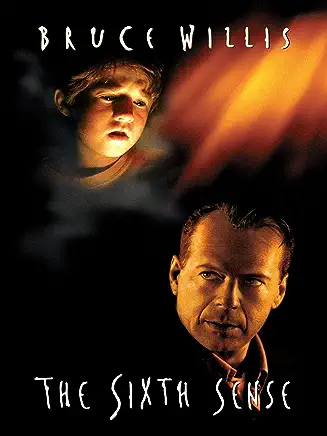Released in 1999, “The Sixth Sense” remains a defining classic in the horror-thriller genre. Directed by M. Night Shyamalan and starring Bruce Willis and Haley Joel Osment, this chilling tale of a young boy with a supernatural gift has captivated audiences and left them questioning reality long after the credits roll.
In this article, we’ll delve into the plot and highlight the outstanding performances that make “The Sixth Sense” a timeless and spine-tingling cinematic experience.
Plot
The film follows the story of Dr. Malcolm Crowe (played by Bruce Willis), a respected child psychologist, who is still haunted by a failure in his past—a former patient, Vincent Grey, whom he was unable to help. Crowe’s world is further shaken when he is unexpectedly shot by Grey, who then turns the gun on himself.
As Crowe grapples with his near-death experience and its emotional aftermath, he takes on a new patient, Cole Sear (played by Haley Joel Osment), a troubled young boy with a disturbing secret. Cole reveals to Crowe that he can see and communicate with the dead, a terrifying ability that isolates him from his peers and terrifies him. Despite his skepticism, Crowe decides to help Cole confront his fears and understand the source of his haunting visions.
The heart of the film lies in Cole’s interactions with the restless spirits he encounters, and Crowe’s determination to guide him through this paranormal ordeal. As Cole navigates the frightening world of the deceased, he uncovers their unresolved issues and discovers that they are often seeking closure and solace. The film deftly explores themes of death, redemption, and the power of human connection.
One of the most iconic and spine-tingling aspects of “The Sixth Sense” is the gradual revelation that Dr. Crowe himself is a ghost, unaware of his own demise. This shocking twist, masterfully concealed throughout the film, leaves audiences reeling and eager to revisit the story with newfound understanding.
Actors
Bruce Willis as Dr. Malcolm Crowe: Willis delivers a nuanced and haunting performance as the tormented child psychologist. His portrayal of a man grappling with his own mortality and guilt is both sympathetic and engrossing. Willis’s understated acting allows the audience to connect with his character on a deeply emotional level.
Haley Joel Osment as Cole Sear: At just 11 years old, Osment’s portrayal of Cole is nothing short of extraordinary. His ability to convey fear, vulnerability, and wisdom beyond his years earned him critical acclaim and an Academy Award nomination. Osment’s performance is a pivotal element that makes “The Sixth Sense” resonate with audiences of all ages.
Box office success
A critical success but also a massive hit at the box office. Here are some key highlights of its financial achievements:
Budget: The film was produced with a relatively modest budget of approximately $40 million, considering the star power of Bruce Willis and the quality of production involved.
Box Office Gross: The film grossed over $672 million worldwide during its theatrical run, making it one of the highest-grossing films of 1999. This financial success was a testament to the film’s universal appeal and word-of-mouth buzz generated by its shocking twist ending.
Critical Acclaim: The film received widespread critical acclaim, further fueling its box office success. Critics praised its storytelling, performances, and the audacious twist ending that left audiences talking and returning to theaters for repeat viewings.
Awards: “The Sixth Sense” received several award nominations, including six Academy Award nominations. Although it won only one Oscar for Best Supporting Actor (Haley Joel Osment), its recognition further solidified its status as a cinematic gem.
Conclusion
“The Sixth Sense” is a cinematic masterpiece that continues to captivate and terrify viewers more than two decades after its release. M. Night Shyamalan’s storytelling prowess, coupled with stellar performances by Bruce Willis and Haley Joel Osment, elevates this supernatural thriller to a level of cinematic brilliance rarely seen in the horror genre.
Its enduring appeal lies not only in its spine-tingling plot but also in its exploration of the human condition and the profound impact of unresolved issues on the afterlife. As we revisit this classic, it reminds us that some mysteries are best left to the realms of the supernatural, and that the most profound and unsettling secrets often lie within ourselves.



